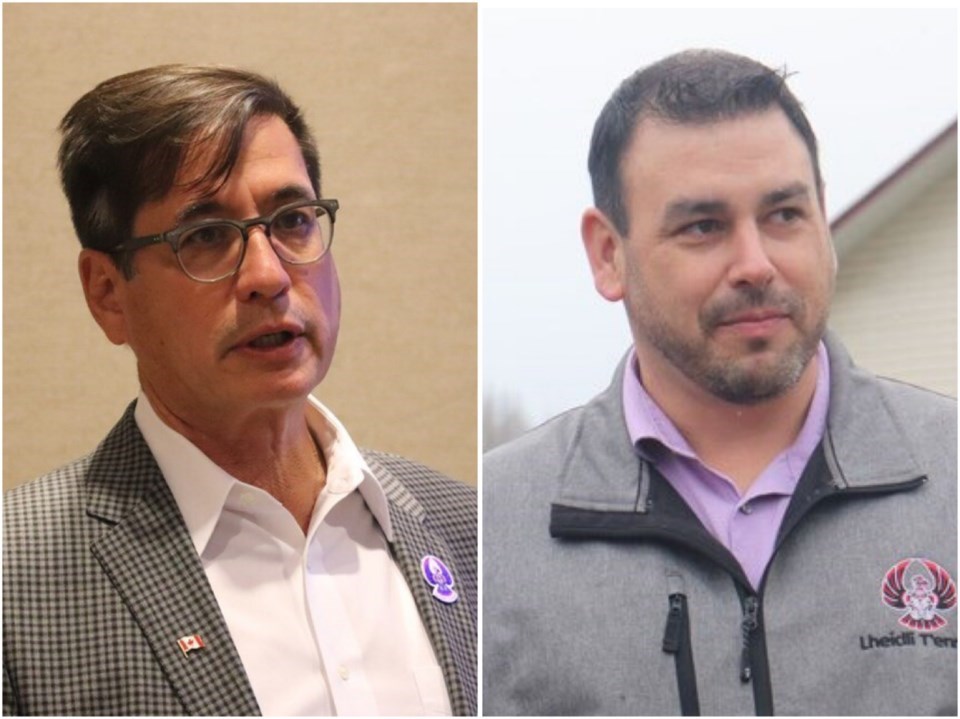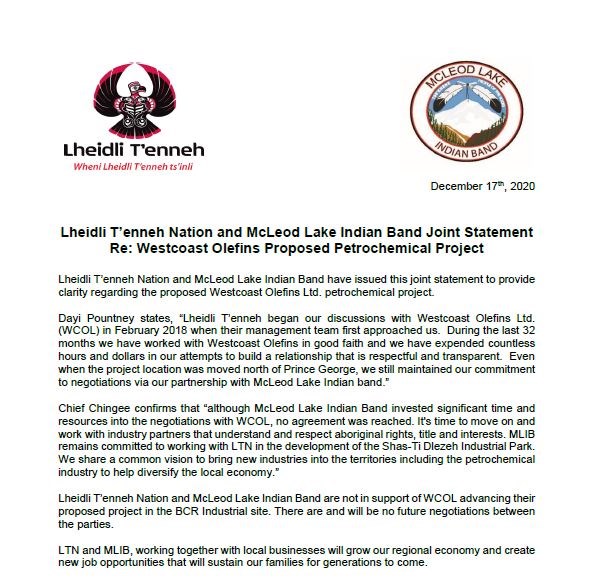West Coast Olefins now faces a major hurdle after First Nations bands say there will be no further negotiations on the companies proposal to return the $5.6-billion petrochemical plant project to Prince George where it was originally planned.
West Coast Olefins President and CEO Ken James announced on Tuesday (Dec. 15) that after a large amount of feedback, they felt moving the project back to its original ideal location was the best move.
James said the next big step in West Coast Olefins' latest move is to reach a collective agreement with local First Nations.
But today (Dec. 17), the Lheidli T'enneh First Nation and McLeod Lake Indian Band put away any hopes there will be negotiations with the company.
"Lheidli T’enneh Nation and McLeod Lake Indian Band are not in support of WCOL advancing their proposed project in the BCR Industrial site," a joint statement reads.
"There are and will be no future negotiations between the parties."
The project was announced last summer, with the company saying it had secured a 300-acre site and planned to build a petrochemical project.
James announced in July 2019 that the project would be built in the BCR Industrial area of the northern capital and create up to 1,000 permanent jobs and roughly 6,000 indirect jobs in the region.
“This will be the biggest project the city has ever seen,” West Coast Olefins president and CEO Ken James said at the July 24, 2019 announcement at the Courtyard Marriott Hotel.
But in May of last year after numerous rumours, he announced the project would be moving, citing the fact many had said they felt the project would be way too close to Prince George, which prompted the move.
"It's not a rumour," when James was asked if it was true the project was moving north of the city on May 7.
"We've had a great relationship developed over the last few months with Chief Chingee and the McLeod Lake Band and we're very excited to be working north with them."
It had seemed the groundwork was laid for the project to officially move away from the city.
“We have been working on this project for about a year and have been working closely with the community for the past six months to gauge whether there was sufficient interest,” James said on May 7.
“We look at a community this size, the education facilities, the river, the rail, the industrial park and a community that wants the jobs - that is a huge piece of it today. You cannot force a project into a community, not in today’s day and age.
"I think if you recall early on in some of the public consultation meetings we had, one of our initial tenants and it has been a theme for us, is we aren't going to build plants where the community doesn't welcome us," James explained. "We heard many people 'this is too close to Prince George.'
"I lived there from '74 to '84 and I'll tell you, I understand the sensitivity of the Prince George airshed so we decided to move it further north, move out of the Prince George airshed, eliminate the need to bring a pipeline into Prince George and so we think it's better. It wasn't an easy decision because I believe we're now going to have some hazards of moving people up and down the road to work every day, so we tried to pick a good compromise."
It was revealed West Coast Olefins and the McLeod Lake Indian Band had signed a binding term sheet two months prior, in March, that outlined the key terms that would underpin an Impact Benefits Agreement related to the Natrual Gas Liquids Recovery Plant that WCOL was planning to construct within the McLeod Lake Indian Band's Territory.
But as of now, the mood has changed drastically.
"Although McLeod Lake Indian Band invested significant time and resources into the negotiations with WCOL, no agreement was reached," McLeod Lake Indian Band Chief Harley Chingee says in the release issued today.
"It's time to move on and work with industry partners that understand and respect aboriginal rights, title and interests. MLIB remains committed to working with LTN in the development of the Shas-Ti Dlezeh Industrial Park.
"We share a common vision to bring new industries into the territories including the petrochemical industry to help diversify the local economy.”
The Lheidli T'enneh First Nation had also said in December of 2019 it had not provided support for the project in Prince George.
"Although we have had very preliminary discussions with WCOL, Lheidli T’enneh wishes to clarify that it does not support either of WCOL’s proposed projects at this time," a news release stated at the time.
"Unfortunately, WCOL has taken steps that have harmed our relationship and raised fundamental concerns about the proposed projects."
Today, Lheidli T'enneh First Nation Dayi Clay Pountney echoed a similar but stronger message, saying they had worked with Westcoast Olefins in good faith and even expended countless hours and money to build a relationship that was 'respectful and transparent.'
“Lheidli T’enneh began our discussions with Westcoast Olefins Ltd. (WCOL) in February 2018 when their management team first approached us," Pountney says.
"During the last 32 months we have worked with Westcoast Olefins in good faith and we have expended countless hours and dollars in our attempts to build a relationship that is respectful and transparent.
"Even when the project location was moved north of Prince George, we still maintained our commitment to negotiations via our partnership with McLeod Lake Indian band.”
PrinceGeorgeMatters has reached out to West Coast Olefins and President and CEO Ken James for a response. This story will be updated should any statement be issued.
- with files from Hanna Petersen and Kyle Balzer, PrinceGeorgeMatters





